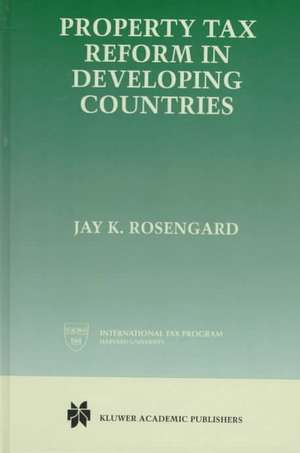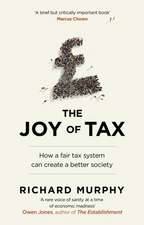Property Tax Reform in Developing Countries
Autor Jay K. Rosengarden Limba Engleză Hardback – 30 dec 1997
Property Tax Reform in Developing Countries develops its examination in three stages. First, a conceptual framework is presented for the formulation, implementation, and evaluation of property tax reform in developing countries. Second, attempts to reform property taxation in four developing countries are examined in detail. Finally, the results of the reform efforts described in the four case studies are evaluated and guidelines for reform are offered. The study concludes with specific recommendations for reforming property tax systems in developing countries, based on the conceptual framework and synthesizing lessons of the case studies.
| Toate formatele și edițiile | Preț | Express |
|---|---|---|
| Paperback (1) | 941.50 lei 6-8 săpt. | |
| Springer Us – 4 noi 2012 | 941.50 lei 6-8 săpt. | |
| Hardback (1) | 947.67 lei 6-8 săpt. | |
| Springer Us – 30 dec 1997 | 947.67 lei 6-8 săpt. |
Preț: 947.67 lei
Preț vechi: 1155.69 lei
-18% Nou
Puncte Express: 1422
Preț estimativ în valută:
181.35€ • 188.19$ • 151.58£
181.35€ • 188.19$ • 151.58£
Carte tipărită la comandă
Livrare economică 17-31 martie
Preluare comenzi: 021 569.72.76
Specificații
ISBN-13: 9780792380955
ISBN-10: 0792380959
Pagini: 234
Ilustrații: XVI, 213 p.
Dimensiuni: 155 x 235 x 18 mm
Greutate: 0.51 kg
Ediția:1998
Editura: Springer Us
Colecția Springer
Locul publicării:New York, NY, United States
ISBN-10: 0792380959
Pagini: 234
Ilustrații: XVI, 213 p.
Dimensiuni: 155 x 235 x 18 mm
Greutate: 0.51 kg
Ediția:1998
Editura: Springer Us
Colecția Springer
Locul publicării:New York, NY, United States
Public țintă
ResearchDescriere
Property Tax Reform in Developing Countries provides a conceptual framework for property tax reform with the intention of making the most compelling argument possible to persuade the reader as to its validity. The text claims that a model for property tax reform in developing countries is derived from a theoretical distillation of empirical experience. The primary objective of this study is to establish, through logic, theory and observation: what constitutes a good property tax system, for whom, and under what conditions; why such a system works; and how inferior systems can be upgraded to approximate well-functioning systems.
Property Tax Reform in Developing Countries develops its examination in three stages. First, a conceptual framework is presented for the formulation, implementation, and evaluation of property tax reform in developing countries. Second, attempts to reform property taxation in four developing countries are examined in detail. Finally, the results of the reform efforts described in the four case studies are evaluated and guidelines for reform are offered. The study concludes with specific recommendations for reforming property tax systems in developing countries, based on the conceptual framework and synthesizing lessons of the case studies.
Property Tax Reform in Developing Countries develops its examination in three stages. First, a conceptual framework is presented for the formulation, implementation, and evaluation of property tax reform in developing countries. Second, attempts to reform property taxation in four developing countries are examined in detail. Finally, the results of the reform efforts described in the four case studies are evaluated and guidelines for reform are offered. The study concludes with specific recommendations for reforming property tax systems in developing countries, based on the conceptual framework and synthesizing lessons of the case studies.
Cuprins
About the Author. Foreword. Author's Preface. 1. Introduction. 2. Jamaica Case Study. 3. Philippines Case Study. 4. Chile Case Study. 5. Indonesia Case Study. 6. Synthesis. Appendix: GDP/GNP Deflators and Exchange Rates. Selected Bibliography. Index. Epigraph.






